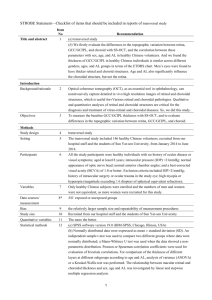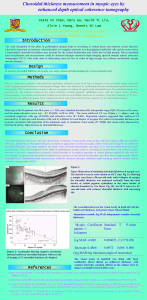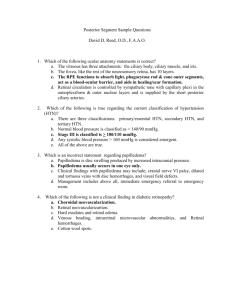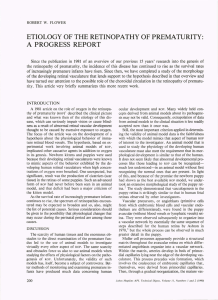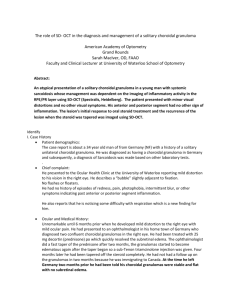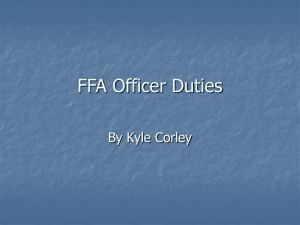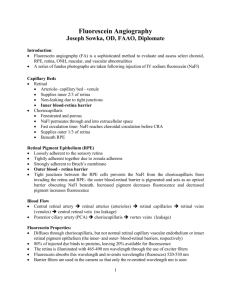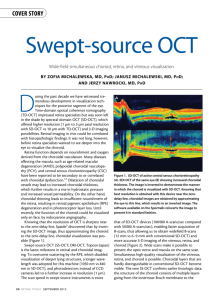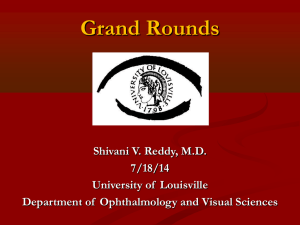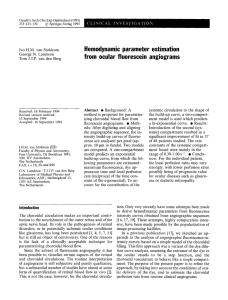FFA - Good Hope Eye Clinic
advertisement
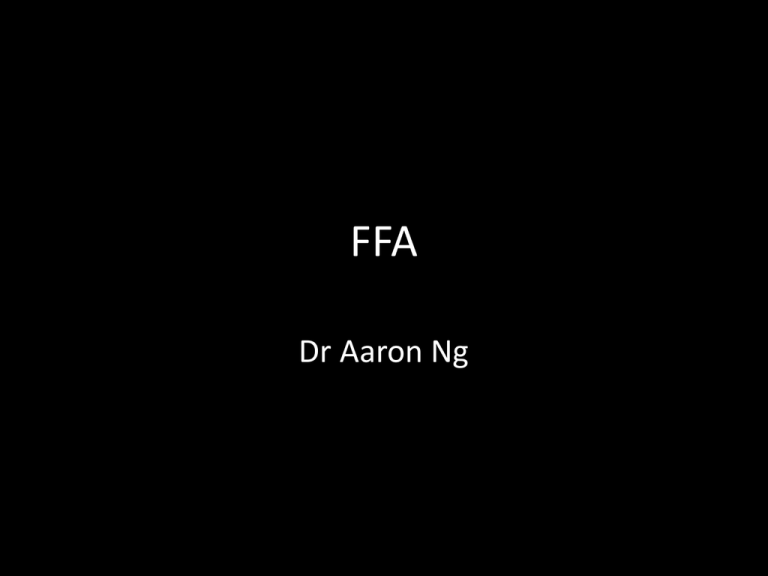
FFA Dr Aaron Ng FFA Principles • Fluorescence – Stimulated by light of shorter wavelength – Emission of light of longer wavelength • Flurescein – Excitation peak 490nm – Emit light of about 530nm FFA Principles: Filters 5 Phases of Angiogram 1. Choroidal (Prearterial): 9-15 sec 5 Phases of Angiogram 2. Arterial phase: 1 sec after choroidal phase 5 Phases of Angiogram 3. Arteriovenous (capillary) phase: early venous laminar flow 5 Phases of Angiogram 4a. Venous phase: Laminar venous flow 5 Phases of Angiogram 4b. Venous phase – complete filling •Max perifoveal capillary filling – 20-25 sec •First pass of fluorescein circulation – 30 sec 5 Phases of Angiogram 5. Late (recirculation) phase • Absent after 10 min Timing of FFA phases • • • • • • • • • Arm to retina (ONH): Posterior ciliary artery Choroidal flush, cilio-retinal artery Retinal arterial phase Capillary transition phase Early venous/lamellar/a-v phase Venous phase Late venous phase Late phase 7-12s 9s 10s 10-12s 13s 14-15s 16-17s 18-20s 5-15 min Foveal dark appearance - Foveal avascular zone - High density of xanthophyll at the fovea - Foveal RPE larger and rich in melanin and lipofuscin Causes of hyperfluorescence 1. 2. 3. 4. 5. 6. Autofluorescence Pseudofluorescence RPE window defect Dye pooling Dye leaking Tissue staining-disc, drusen, chorioretinal scar Autofluorescence Optic disc drusen Autofluorescence Lipofuscin Autofluorescence Angioid streaks RPE window defect Atrophic ARMD Dye pooling Subretinal - CSCR Dye pooling Sub-RPE - PED Dye leaking Proliferative DR Cystoid Macula Oedema Late staining Causes for hypofluorescence • Masking of retinal fluorescence – Pre-retinal lesions block all fluorescence – Deeper retinal lesions e.g. intraretinal haemorrhages and hard exudates block only capillary fluorescence Pre-retinal lesions Blockage to all fluorescence Intraretinal lesions Hard exudates Intraretinal haemorrhages Causes for hypofluorescence • Masking of background choroidal fluorescence – Conditions that block retinal fluorescence – Conditions that block only choroidal • Sub-retinal or subRPE lesions • Increased RPE density • Choroidal lesions • Filling defects – Vascular occlusions – Loss of vascular bed (myopic degen, choroidaeraemia) Increased RPE density CHRPE Choroidal naevus Filling defects Capillary drop – out in DR (vascular occlusion) Choroidaeraemia (loss of vascular bed) CNVM subtypes Classic Atypical classic Occult Minimally classic Indocyanine Green Angiography • Advantages over FFA – Study of choroidal vasculature otherwise prevented in FFA due to RPE blockage – Near-infrared light utilised penetrates melanin, xanthophylls, exudates and subretinal blood – Infrared is scattered less cf visible light, thus suitable in eyes with media opacities – 98% ICG molecules bound to protein, thus remaining in the blood vessels ICGA Principles • Infrared excitation (805nm) • Infrared emission (835nm) Phases of ICGA • Early phase (first 60 sec post injection) – choroidal arteries • Early mid phase (1-3 min) – choroidal veins and retinal vessels • Late mid phase (3-15 min) – choroidal vessels facing but retinal vessels are still visible • Late phase (14-45 min) – hypofluorescent choroidal vessels and gradual fading of diffuse hyperfluorescence Causes for hyperfluorescence • “Window defect” • Retinal or choroidal vessel leakage • Abnormal retinal or choroidal vessels Causes for hypofluorescence • Blockage – Pigment, blood, fibrosis, infiltrate, exudate, serous fluid – PED are predominantly hypofluorescent on ICGA as cf FFA • Filling defect – Vascular occlusion – Loss of choroidal or retinal circulation Clinical indications • PCV • CSCR • Posterior uveitis (extent of disease involvement) • Breaks in Bruch’s (lacquer cracks, angiod streaks) • Contraindication for FFA CSCR FFA ICGA CSCR PCV
